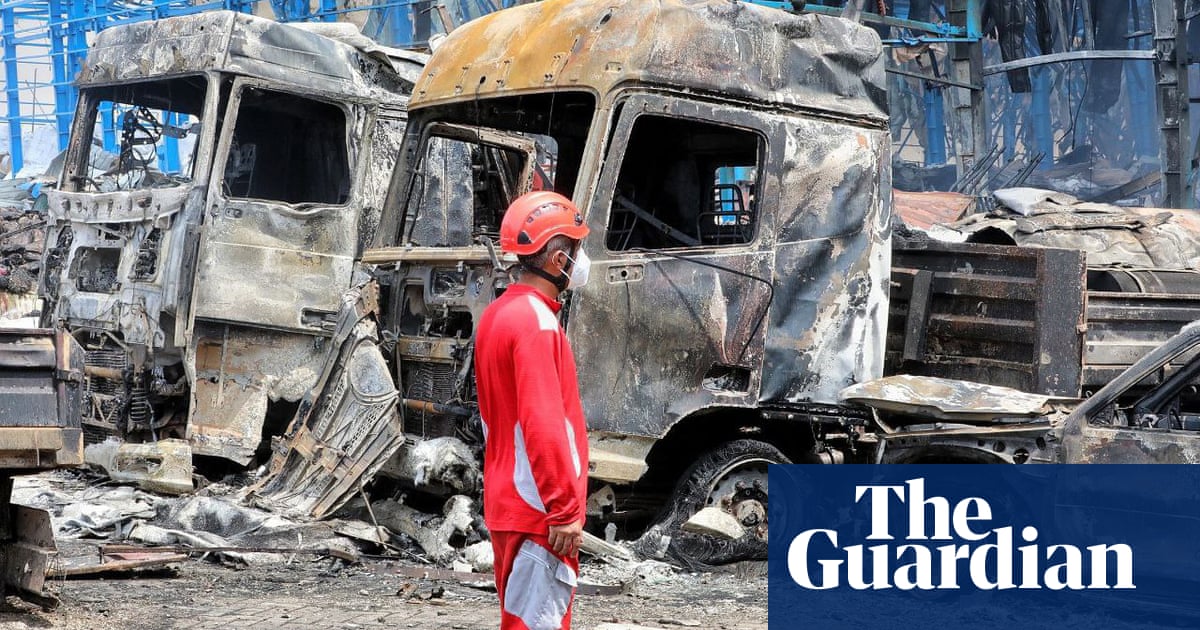Iranian journalists have warned of a media crackdown after a series of incidents, the most recent an explosion at a munitions company in which one person was killed and two injured.
The explosion on Tuesday, for which there has been no official explanation, occurred in Isfahan, only two days after a thwarted cyber-attack on the communications infrastructure on Sunday, and a huge explosion on Saturday at the strategic southern port of Shahid Rajaee, near Bandar Abbas.
The death toll from theexplosion at the porthas increased to 65, with more than 1,000 people injured.
Iran has ruled out foreign involvement in the Shahid Rajaee explosion, pointing instead to negligence and strong evidence that unlabelled combustible chemicals, undeclared to customs, were inappropriately stored leading to a fire and a deadly chain reaction of explosions. An MP who visited the site put the chances of sabotage at 1%.
Suspicion of cover-ups is rife, however, and the filing of criminal charges against media outlets and activists by the Tehran prosecutor’s office has caused journalists inside Iran to voice concern about press freedom. Mizan news agency, the judiciary’s official media outlet, said violators would face legal consequences for attempting to publish “illegal news” about the explosion.
One Tehran-based reporter, speaking to the Guardian on condition of anonymity because of safety concerns, said: “Not only were we warned against ground reporting, we were also banned effectively from sharing reports on social media. In face of a tragedy such as this, what is there to hide? Either the death toll is way more than 70, or they are suppressing the real cause of the explosion. Following the filing of charges, our newsrooms are also self-regulating in fear that they’ll be facing legal consequences.”
Officials have confirmed only that the goods that exploded on Saturday did not appear to have had a digitised reference code as required by Iranian customs law.
As many as 130,000 containers are stored at the port, partly because the lack of infrastructure means customs authorities and government ministries do not process goods for export for weeks, a problem raised by the Iranian president Masoud Pezeshkian on his visit on Sunday.
Iranian officials said on Tuesday the fire had, after four days, been brought under control and toxic substances had not leaked into the Persian Gulf. Reporting of the explosion has become increasingly difficult, with officials warning against believing foreign media or opposition groups such as the National Council of Resistance of Iran.
Iranian officials have blamed mislabelling of dangerous cargo, but media outlets have not yet identified the company alleged to have imported the combustible material. The naval branch of the Islamic Revolutionary Guards Corps insisted that the port was purely commercial, and said military goods did not pass through.
Tuesday’s factory explosion was reported to have happened at the Ava Nar Parsian chemicals company, located in the Meymeh district of Isfahan, a site overseen by Iran’s national security council.
The official committee investigating Sunday’s port explosion has said “failures in observing safety principles and passive defence have been confirmed”.
Shahid Rajaee port, with an area of about 2,400 hectares, has an annual capacity to handle 70m tonnes of cargo, and is estimated to process half of Iran’s imports.
Mohammad Mehdi Shahriari, a member of the Iranian parliament’s national security commission, said four committees were examining potential causes, including the possibility that Israel had been involved in an attempt to disrupt negotiations between the US and Iran over the future of its nuclear programme.
Mohammad Baqer Qalibaf the speaker, said parliament was looking at whether any negligence or intent was involved.
